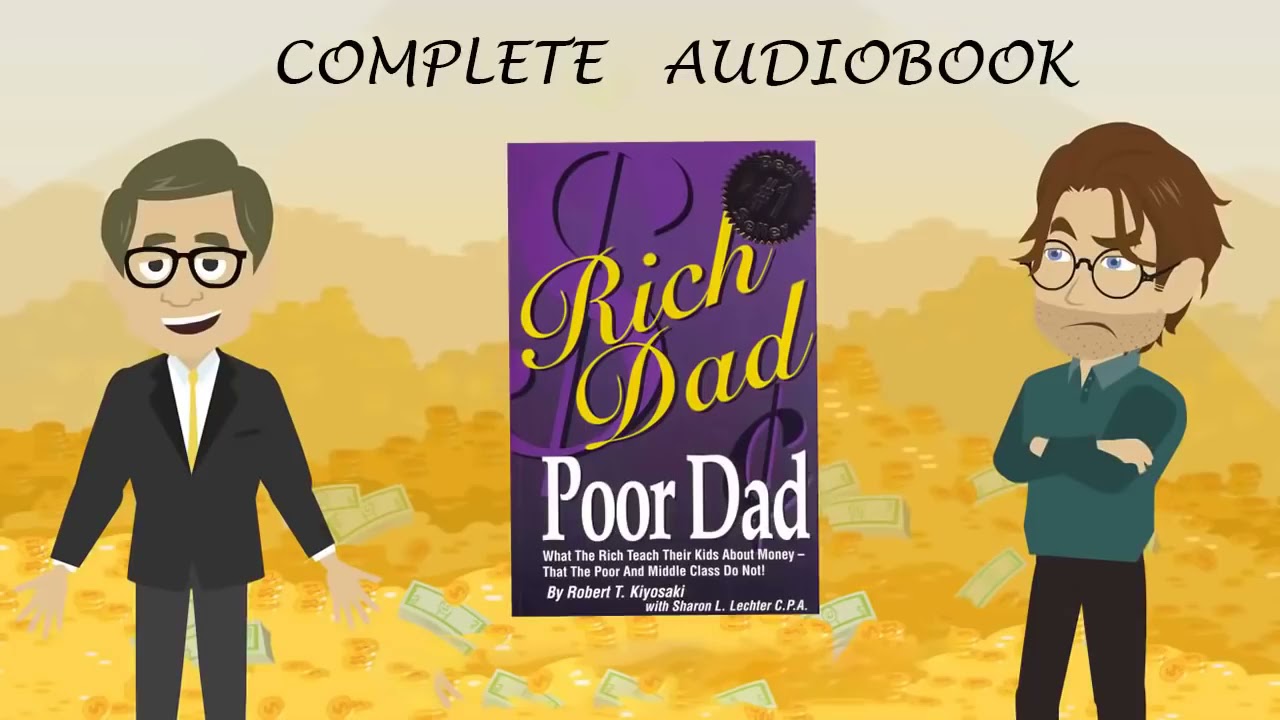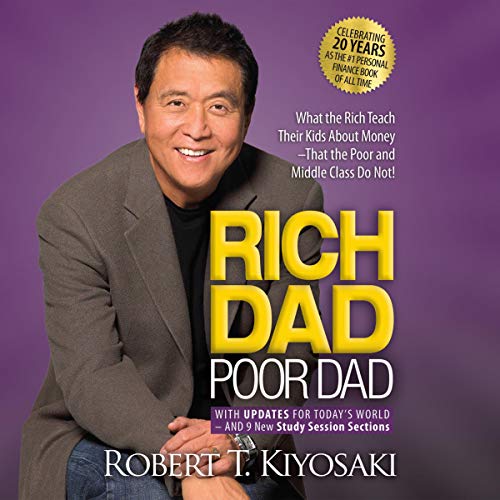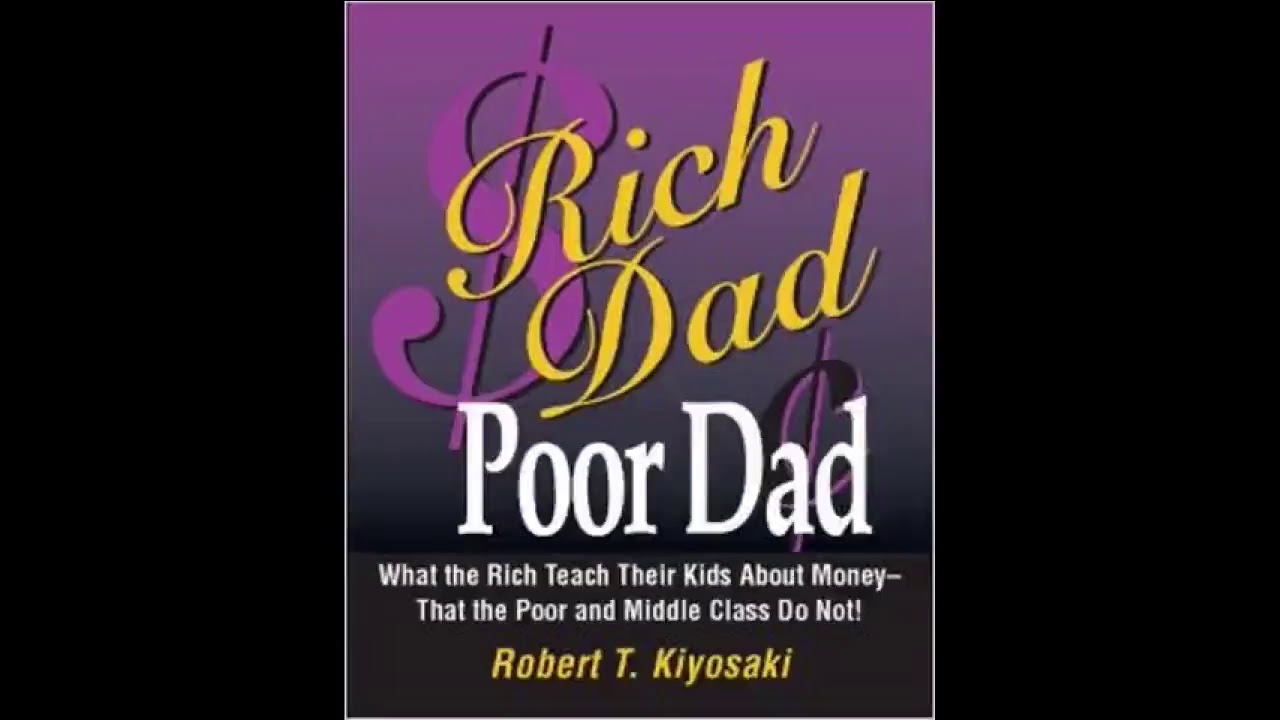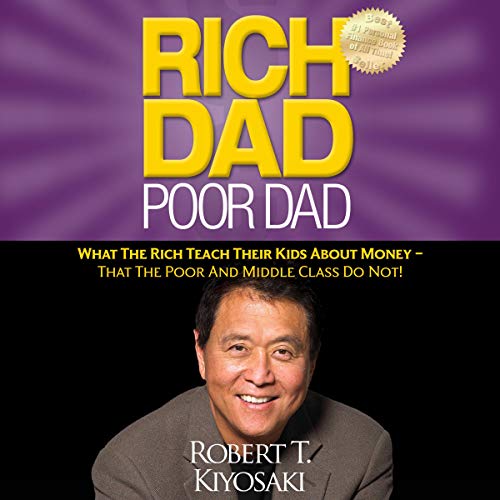“Rich Dad Poor Dad” by Robert T. Kiyosaki contrasts the financial philosophies of his two fathers. The audiobook teaches essential financial literacy.
This influential audiobook explores the differing financial mindsets of Kiyosaki’s “Rich Dad” and “Poor Dad. ” The “Poor Dad” represents conventional wisdom, emphasizing job security and saving money. In contrast, the “Rich Dad” advocates for wealth-building through investments and entrepreneurship.
Kiyosaki shares personal anecdotes and practical advice to shift listeners’ perspectives on money management. The audiobook encourages developing financial intelligence, understanding assets and liabilities, and the importance of passive income. Perfect for those seeking financial freedom, “Rich Dad Poor Dad” provides valuable insights for building wealth and achieving financial independence.

Introduction To ‘rich Dad Poor Dad’
The audiobook ‘Rich Dad Poor Dad’ by Robert T. Kiyosaki is a financial guide. It contrasts two different mindsets towards money and wealth. This book has influenced millions around the world. The audiobook format makes it easy to absorb its lessons.
The Genesis Of A Financial Classic
‘Rich Dad Poor Dad’ was first published in 1997. It quickly became a bestseller. The book shares the stories of Kiyosaki’s two dads. One dad is his real father, the “Poor Dad.” The other is his best friend’s father, the “Rich Dad.” These contrasting father figures shape his views on money and investing.
The “Poor Dad” values job security and a steady paycheck. The “Rich Dad” believes in financial education and investing. This dual perspective offers a unique take on financial success.
Robert T. Kiyosaki: The Man Behind The Book
Robert T. Kiyosaki is an American businessman and author. He has a background in entrepreneurship and investing. His personal experiences form the core of his teachings.
Kiyosaki is known for his straightforward and engaging style. He simplifies complex financial concepts for easy understanding. His goal is to educate people on financial independence.
Here are some key points about Robert T. Kiyosaki:
- Author of over 26 books
- Founder of the Rich Dad Company
- Advocate for financial literacy
Kiyosaki’s insights have empowered many to take control of their finances. His work remains relevant and influential today.

The Core Philosophy
The audiobook Rich Dad Poor Dad by Robert T. Kiyosaki introduces a core philosophy. It emphasizes the importance of financial education and contrasts two different financial mindsets.
The Power Of Financial Education
Financial education is the key message in Rich Dad Poor Dad. Kiyosaki stresses learning about money, investing, and managing finances.
He believes that schools don’t teach kids about money. Instead, he suggests self-education and learning from successful people.
Here are some key lessons:
- Understand how money works.
- Learn to manage risk.
- Invest in assets, not liabilities.
These lessons aim to create financial independence and wealth.
Rich Dad Vs. Poor Dad: Contrasting Perspectives
Kiyosaki shares the contrasting views of his two fathers. His “Poor Dad” was his biological father, a well-educated man with a traditional job. His “Rich Dad” was his friend’s father, a successful entrepreneur.
| Rich Dad | Poor Dad |
|---|---|
| Advocated for owning businesses and investments. | Believed in getting a secure job. |
| Focused on building assets. | Focused on earning a steady paycheck. |
| Emphasized financial education. | Relied on traditional education. |
These perspectives highlight different approaches to wealth and success.
Rich Dad’s advice centers on financial freedom, while Poor Dad prioritizes job security.
Key Lessons From The Book
Robert T. Kiyosaki’s Rich Dad Poor Dad is a treasure trove of financial wisdom. The audiobook delves into the differences in mindset between the rich and the poor. It focuses on the importance of financial education and smart investment strategies. Here are some key lessons from the book.
Assets Vs. Liabilities
One of the most critical lessons from Rich Dad Poor Dad is understanding the difference between assets and liabilities. Kiyosaki explains that assets bring money into your pocket. Liabilities take money out of your pocket.
- Assets: Stocks, bonds, rental properties, businesses.
- Liabilities: Mortgages, car loans, credit card debt.
He emphasizes the importance of acquiring assets. By doing so, you ensure a steady stream of income. This leads to financial independence.
The Importance Of Financial Intelligence
Kiyosaki stresses that financial intelligence is crucial for wealth creation. Formal education often lacks practical financial lessons. He believes financial education should be a lifelong pursuit.
Understanding taxes, investments, and market trends is key. With this knowledge, you can make informed financial decisions. It helps you avoid common pitfalls that lead to financial stress.
Why Making Money Work For You Matters
Another significant lesson is the concept of making money work for you. Kiyosaki advises against working solely for a paycheck. Instead, he encourages investing in income-generating assets.
- Invest in stocks and bonds.
- Purchase rental properties.
- Start or invest in businesses.
These investments generate passive income. Over time, this income can surpass your expenses. This allows you to achieve financial freedom.
Impact On Personal Finance
The Rich Dad Poor Dad Audiobook by Robert T. Kiyosaki has changed many lives. Its unique approach to personal finance offers fresh perspectives. People often find themselves rethinking their financial habits after listening.
Below, we explore two key impacts: transforming financial mindsets and real-life success stories.
Transforming Financial Mindsets
Many people grow up learning outdated financial principles. The Rich Dad Poor Dad Audiobook introduces new ideas:
- Assets vs. Liabilities: Learn the difference and focus on assets.
- Financial Education: Understand the importance of financial literacy.
- Entrepreneurship: Discover why owning a business can be better than having a job.
These concepts change how listeners view money. They start making better financial decisions. They also gain confidence in managing their finances.
Real-life Success Stories
Many people have shared success stories after listening to the audiobook. Here are a few examples:
| Listener | Achievement |
|---|---|
| John Doe | Started a successful online business. |
| Jane Smith | Invested in rental properties. |
| Mike Johnson | Paid off all debts in two years. |
These stories show the audiobook’s power. Listeners can change their lives by applying its lessons. The audiobook acts as a catalyst for financial transformation.
The Audiobook Experience
Rich Dad Poor Dad by Robert T. Kiyosaki is a must-read for anyone. The audiobook version brings financial wisdom directly to your ears. Enjoy learning about money, investments, and wealth-building strategies while on the go.
Bringing Financial Wisdom To Your Ears
The Rich Dad Poor Dad audiobook makes it easy to learn about finances. Listen while you commute, exercise, or relax at home. The audiobook is narrated in an engaging and clear manner. This makes complex financial concepts easy to understand.
Listening to the audiobook can be more impactful. Hear the passion and emphasis in the narrator’s voice. This enhances the learning experience and helps retain information better.
Why Choose The Audiobook Version
Choosing the audiobook version offers several benefits:
- Convenience: Listen anytime, anywhere.
- Multitasking: Learn while doing other activities.
- Engagement: Narration can be more engaging than reading text.
Here are some reasons why the audiobook version stands out:
- Time-Efficient: Save time by listening during your daily routine.
- Accessibility: Ideal for those who find reading challenging.
- Enhanced Retention: Audio learning can improve memory and understanding.
Experience the wisdom of Rich Dad Poor Dad in a whole new way. The audiobook version is perfect for busy individuals. Discover the secrets to financial success while making the most of your time.

Critiques And Controversies
Robert T. Kiyosaki’s Rich Dad Poor Dad audiobook has inspired many. Yet, it has also faced significant critiques and controversies. Some financial experts have challenged Kiyosaki’s teachings. Debates about the book’s advice and principles continue. Let’s explore these critiques and controversies.
Criticism From Financial Experts
Many financial experts have criticized Kiyosaki’s advice. They argue it lacks concrete financial strategies. Experts point out that the book offers general ideas but not specific steps. These critics believe the book oversimplifies complex financial topics. They argue that this can mislead readers.
Additionally, some experts find the book’s investment advice risky. They caution against some of Kiyosaki’s suggested practices. For instance, investing heavily in real estate without proper knowledge can be dangerous. They emphasize the need for a balanced approach to investments.
Debates On Kiyosaki’s Teachings
There are ongoing debates about Kiyosaki’s teachings. Some believe his ideas promote financial independence. Others argue they encourage unrealistic expectations. Supporters praise his focus on financial education and entrepreneurship. They say it empowers people to take control of their finances.
Critics, on the other hand, challenge his emphasis on debt. Kiyosaki promotes the use of debt for investment purposes. Critics argue this can lead to financial trouble. They believe his advice can be dangerous for inexperienced investors. These debates highlight the divided opinions on Kiyosaki’s philosophy.
| Critiques | Examples |
|---|---|
| Lack of Specific Strategies | General ideas without clear steps |
| Risky Investment Advice | Heavy real estate investments |
| Overemphasis on Debt | Using debt for investments |
Despite these critiques, Rich Dad Poor Dad continues to be a popular resource. Its influence on personal finance is undeniable. Readers must weigh both the pros and cons. This helps them make informed decisions about their financial future.
Implementing The Teachings
Listening to the Rich Dad Poor Dad Audiobook by Robert T. Kiyosaki can be life-changing. But the real magic begins when you start implementing the teachings. This section will guide you through practical steps to kickstart your financial journey and tips for everyday investors.
Starting Your Financial Education Journey
Begin your journey by understanding the basics of money. Read books and listen to audiobooks about finances. Learn the difference between assets and liabilities. Focus on buying assets that put money in your pocket.
Join financial education courses. They provide structured learning. Participate in discussions and ask questions. Surround yourself with like-minded individuals. Share knowledge and experiences.
Set clear financial goals. Write them down. Break them into smaller, achievable steps. Track your progress regularly. Adjust your plans if needed. Celebrate small wins to stay motivated.
Practical Tips For Everyday Investors
Start investing early. Even small amounts make a difference. The power of compounding grows your money over time. Diversify your investments to spread risk. Consider stocks, bonds, real estate, and mutual funds.
Create a budget. Track your income and expenses. Identify areas where you can save. Use savings to invest in assets. Avoid unnecessary debt. Pay off high-interest loans first.
Build an emergency fund. Set aside money for unexpected expenses. Aim to save at least three to six months’ worth of living expenses. This provides a safety net.
Stay informed about market trends. Read financial news and reports. Understand economic indicators. Make informed investment decisions.
Here is a simple table to help you track your investment progress:
| Month | Investment Amount | Asset Type | Return |
|---|---|---|---|
| January | $500 | Stocks | 5% |
| February | $300 | Mutual Funds | 3% |
| March | $200 | Bonds | 2% |
Remember, the key is consistency and patience. Financial freedom doesn’t happen overnight. Keep learning, stay disciplined, and watch your wealth grow.
Beyond ‘rich Dad Poor Dad’
The audiobook Rich Dad Poor Dad by Robert T. Kiyosaki offers valuable lessons. It teaches about financial literacy, investing, and personal finance. But there’s more to explore beyond this audiobook. This section dives deeper into further learning resources and continuing your financial education journey.
Further Reading And Learning Resources
Expand your knowledge with these additional books and resources:
| Resource | Description |
|---|---|
| Cashflow Quadrant | This book helps you understand the four types of people who make up the world of business and the core value of financial education. |
| The Millionaire Next Door | Learn the habits of wealthy individuals and how they manage their money. |
| Think and Grow Rich | A classic book that teaches the mindset and principles of wealth creation. |
| Financial Freedom with Real Estate Investing | Gain insights on how to achieve financial freedom through real estate investments. |
Continuing The Financial Education Journey
Continuing your financial education is crucial. Here are some ways to keep learning:
- Online Courses: Platforms like Udemy and Coursera offer great financial courses.
- Podcasts: Listen to financial experts discuss various topics.
- Workshops and Seminars: Attend events to learn from professionals.
- Networking: Connect with like-minded people to share knowledge.
Staying updated with financial news and trends is essential. Follow reputable financial news websites and blogs. This helps you stay informed about market changes and new opportunities.
Conclusion
“Rich Dad Poor Dad” offers valuable lessons on financial education. Listening to the audiobook can transform your mindset. It’s a must-read for anyone seeking financial freedom. Dive into Robert T. Kiyosaki’s insights and start your journey towards wealth today. Don’t miss out on this life-changing opportunity.



